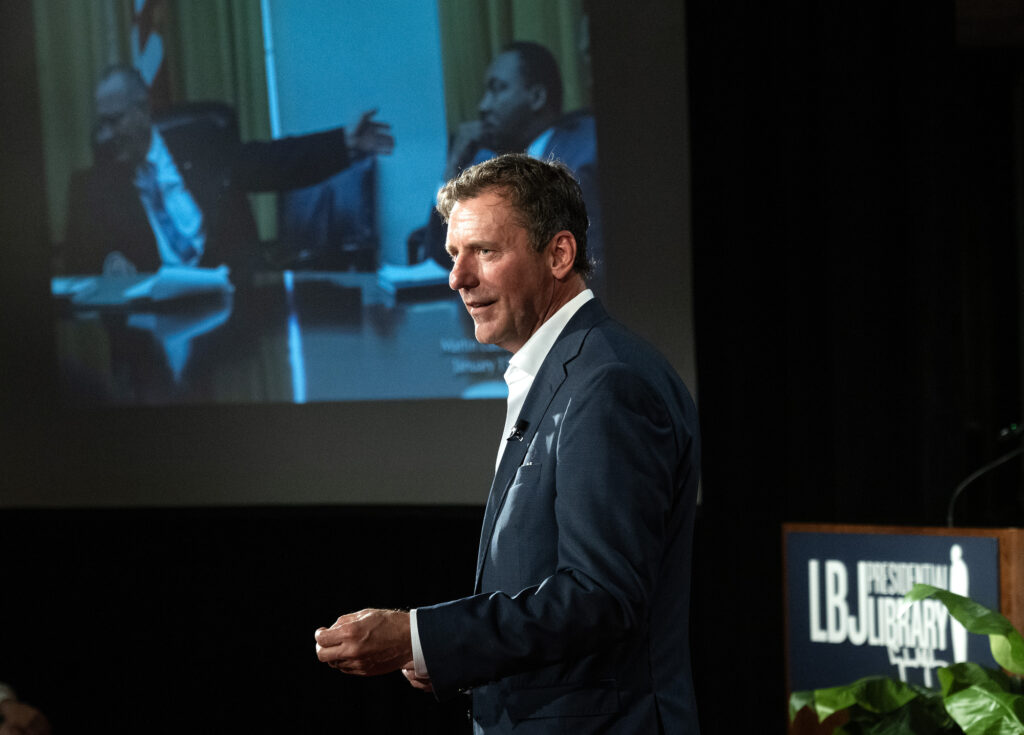By Mark Updegrove
In the fall of 2014, I joined a group of 15 or so representing the foundations of George W. Bush, Bill Clinton, George H.W. Bush, and Lyndon Johnson convened at the George W. Bush Presidential Center in Dallas to conduct interviews with candidates for the first class of Presidential Leadership Scholars. The concept was simple: To recruit those already making a difference in the public or private sectors and increase their impact by sharing new ways of thinking about leadership.
We had high hopes. Just weeks earlier, Presidents George W. Bush and Bill Clinton jovially announced the program at the Newseum in Washington, the U.S. Capitol looming in the distance outside the window. “At a time of heightened partisanship in Washington,” the New York Times wrote of the occasion, “it seemed a brief respite to watch former Presidents George W. Bush and Bill Clinton sit side by side on stage and gush about each other’s leadership and acute decision-making skills.”
Still, though PLS had been announced auspiciously by two two-term former presidents, we didn’t quite know what to expect. What would the program ultimately look like? How would it take shape?
We interviewed in groups of three, prospective PLSers beamed to us virtually, a somewhat novel concept before the COVID-19 Zoom boom. As we met the candidates, drawing them out on their resumes and Personal Leadership Projects, we realized just how extraordinary they were – their accomplishments, their aspirations, their spirit.
At one point, after my fellow interviewers and I had thrown a barrage of questions at an especially singular applicant, we asked her if she had any questions of us.
“Yes,” she answered. “What gives you hope?”
“You!” we all responded in unison.
And that has been one of the constants of PLS. As much as the program may give hope to those in each cohort, we, the ones offering the lessons of our respective presidents, draw inspiration from you and all that you’re doing to make our world a better place.
With our divided nation at a turning point, your efforts have never been more important. You hear that phrase a lot – never been more important – and it can sound like hyperbole. But look around, tune into any responsible news channel – how can it not be true?
At such times, one could cynically turn his or her back on our country and cast a blind eye toward the troubles of the rest of the world. So, while your commitments are vitally important, they’re also doubly admirable.
One of the lessons of Lyndon Johnson’s presidency is that it is “We the People” who make the difference in our country – and not just because we vote or pay taxes. LBJ, as you heard in our PLS module at the LBJ Library, would not have seen the fruition of the Civil Rights Act, the Voting Rights Act, or the Fair Housing Act – huge leaps forward in the quest for civil rights and social justice – without Martin Luther King and the soldiers of the Civil Rights Movement he led boldly awakening “the conscience of a nation.” The people, propelling a movement, held our nation to its highest ideals. They made the difference.
But, as Dr. King showed us, it required leadership.
You are the leaders. Through your efforts and initiatives, you are the ones strengthening our country in a time of need and building a more just, equitable, humane world. You are why PLS was created – to offer you a greater set of tools; open up a network of like-minded colleagues; and lead us, in big ways and small, toward a brighter day.
In so doing, you give us hope.
Mark Updegrove is President and CEO of the LBJ Foundation.

